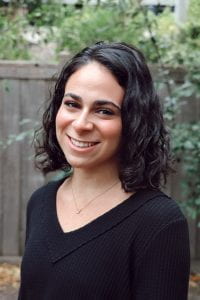UNDERGRADUATE RESEARCH BLOGS
The Office of Undergraduate Research sponsors a number of grant programs, including the Circumnavigator Club Foundation’s Around-the-World Study Grant and the Undergraduate Research Grant. Some of the students on these grants end up traveling and having a variety of amazing experiences. We wanted to give some of them the opportunity to share these experiences with the broader public. It is our hope that this opportunity to blog will deepen the experiences for these students by giving them a forum for reflection; we also hope these blogs can help open the eyes of others to those reflections/experiences as well. Through these blogs, perhaps we all can enjoy the ride as much as they will.
EXPLORE THE BLOGS
- Linguistic Sketchbook
- Birth Control Bans to Contraceptive Care
- A Global Song: Chris LaMountain’s Circumnavigator’s Blog
- Alex Robins’ 2006 Circumnavigator’s Blog
- American Sexual Assault in a Global Context
- Beyond Pro-GMO and Anti-GMO
- Chris Ahern’s 2007 Circumnavigator’s Blog
- Digital Citizen
- From Local Farms to Urban Tables
- Harris Sockel’s Circumnavigator’s Blog 2008
- Kimani Isaac: Adventures Abroad and At Home
- Sarah Rose Graber’s 2004 Circumnavigator’s Blog
- The El Sistema Expedition
- The World is a Book: A Page in Rwand
Olivia P.
Olivia Pierce
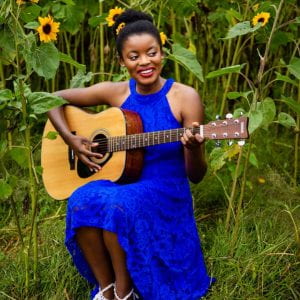
Please briefly summarize your research.
I am conducting archival research with Dr. Joshua Chambers-Letson in the Performance Studies Department. Our work includes looking at the correspondence of queer of color artists in order to articulate how they incorporate themes of love and loss into their works and creative processes. Additionally, we conducted archival research on the avant-garde performance movement that took place in New York in the 1970s to learn more about how Asian and Asian-American artists such as Yoko Ono, Shigeko Kubota, and Nam June Paik, express their identities and experiences through music, technology, and performance. Our research culminated with a trip to New York, where we talked to artists about their present-day processes and studied in the archives.
What made you interested in pursuing (interdisciplinary) research more broadly?
I was interested in pursuing research specifically related to artists and their identities because as a recording artist, I strive to incorporate themes surrounding my own identity into my music. I thought it would be immensely beneficial for me to learn more about the legacy of artists who have approached their creative processes in a similar way throughout history.
How has it been working with faculty to transition from an assistant position to a more independent role?
My research professor has been incredibly helpful in equipping me with the skills and resources I need to pursue my own independent project. I’ve also been able to receive feedback and encouragement along the way as we’ve worked together, which has made the transition very manageable.
What’s been your favorite part about being in a cohort with other scholars?
My favorite part about being in a cohort with other scholars is hearing about everyone’s different projects and interests. Additionally, I personally feel like I couldn’t have been matched with a better professor or had a better experience, and it’s really fun to be in a cohort because everyone I’ve talked to feels that way about their mentorship experience as well.
Do you have any tips or advice for first years similar to you who are interested (but maybe hesitant) to apply for a 15 month long program?
I really like the fact that this program is 15 months because it relieves the pressure to complete a project within 8 weeks that you might encounter with a summer program. Additionally, 15 months gives me time to adjust to doing research while on the quarter system and develop a lasting connection with my mentor.
Favorite breakfast food?
Blueberry waffles!
What’s the most interesting thing you’ve learned/read about/listened to this week?
Alicia Keys’ new album “Keys!” She gave it an A-side and a B-side which I think is really cool.
Natalie
Natalie
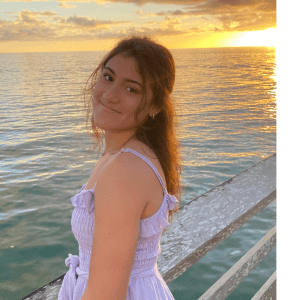
Please provide a brief summary of your research.
I took the lead on adapting a manual to be used in the quantitative analysis of behavioral regulation skills in 12-month olds. This contributes to larger research on the earliest emergence of psychopathology in infancy and early childhood.
What made you interested in pursuing interdisciplinary research more broadly?
I am interested in clinical or academic research as a career path, specifically in the field of developmental neuroscience and psychology. I was looking for hands-on experience in research so I could get a better idea of what a career in research may look like.
What made you initially interested in researching your project in particular?
I am interested in infant and early childhood development, and Dr. MacNeill’s work struck me as having very important and relevant implications for future use as our focus on early mental health intervention increases. This project allowed me to increase my knowledge of early childhood development directly while also working on the “back-end” of developing research questions and methods.
Describe your experiences with research thus far in your career.
My experience was very informative and engaging. I definitely had to shift my mentality from a student’s perspective to a direct contributor to a project, and in doing so assumed a lot of responsibility and self-discipline. I had the chance to improve upon my academic writing and also learned the ins and outs of behavioral coding, which I had never done before.
Any tips or advice you have for students interested in pursuing undergraduate research?
The hardest part is starting! I recommend doing some preliminary research into what labs are out there doing work that interests you and reaching out to get more information. Most PIs are willing and excited to talk to you about their research so that you can get a better idea of what you’re really interested in. The Office of Undergraduate Research has so many resources and people willing to chat about getting started in research, so definitely take advantage of that resource too (I took the SRW class my sophomore year and it was extremely helpful)!
Favorite breakfast food?
Breakfast Burritos!
Malena
Malena Otero
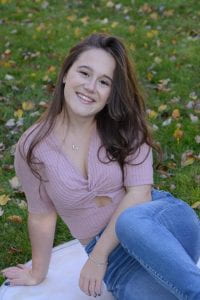
What made you initially interested in researching your project in particular?
Shortly before joining the Life-Span Development Lab I took a class on Positive Psychology. In this class I was introduced to a large field of psychology largely unexplored. While there is endless research on what can go “wrong” with the mind, there is much less out there on the effects of human flourishing. One of the researchers that we learned about was Barbara Fredrickson, whose work on positivity resonance as the foundation of love truly stood out to me. When I started working on the EIF study at LDL, I saw the potential to explore this phenomenon of positivity resonance on a demographic that had been largely ignored, friendships in young adults.
Please provide a brief summary of your research.
This summer I worked as an administrator and experimenter for our Emotion in Friendships study, where we looked at the role of emotions in dyadic interactions. Pairs of friends participated in a conversation of areas of disagreement and one of areas of agreement, and were asked to fill out a series of questionnaires related to their emotions, well-being, and social experiences. I also spent the summer training as a technician for our Caregiver-Youth Interaction Study, which looks at how emotional interactions between youths experiencing symptoms of thought disorder and their parent/caregiver. This study aims to elucidate how these interactions may influence wellbeing for both participants.
What made you interested in pursuing (interdisciplinary) research more broadly?
In high school I participated in a Psychology summer program at Columbia where one of our assignments was to design a fake study. We were able to “test” this study on our classmates, and then presented our “findings” as a final project. In conceptualizing, designing, and conducting this study and then analyzing our findings I found a love for research. The idea of being able to test different areas of interest I had within the field of Psychology quantitatively and determine existing relationships in the real world seemed fascinating. A few years later when I was applying to colleges, I saw all the research opportunities Northwestern offers and knew I absolutely had to go for it.
Describe your experiences with research thus far. Was it tricky? What skills do you think you’ve gained?
The trickiest aspect of research I have experienced so far is the long-term nature of a research project. The life-span of a research study is long, and sometimes goals that you thought would wrap up quickly can end up taking longer than anticipated. Being involved in a research study from recruitment, through data cleaning and analysis truly makes you realize that research is much more than analyzing data. In my time at the Life-Span Development Lab, I have learning to set achievable goals and manage longer timelines, keeping motivated to follow through on a longterm project.
Any tips or advice you have for students similar to you that are interested in pursuing undergraduate research?
Before getting involved in research I at a loss on how to get involved. Research at such a notorious research institution seemed larger than life, and I was so nervous to reach out. Now that I have had a chance to work in research at Northwestern, I realize just how much support there is to get involved. The Office of Undergraduate Research has endless opportunities and many people working to help you get involved in research, all you have to do is reach out!
Favorite breakfast food?
Chocolate Chips Pancakes!
What’s the most interesting thing you’ve learned/read about/listened to this week?
In my Advanced Statistics and Experimental Design we are learning about the perils of underpowered and overpowered studies. I found this super interesting considering how relevant it is to research but also how little it is emphasized.
Benjamin
Benjamin Weiss
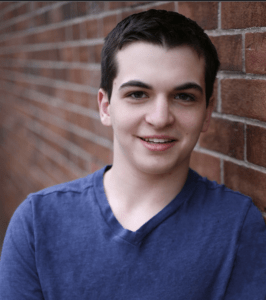
Please provide a brief summary of your research.
My research involves the exploratory synthesis of solid-state compounds. After designing a chemical reaction, we utilize X-ray diffraction techniques to identify the compound or (if unidentified) solve the structure of the new compound. Subsequent characterization and investigation on the properties of the compound can then occur. I investigate a class of compounds known as thermoelectric materials which can absorb heat and generate electricity.
What made you interested in pursuing (interdisciplinary) research more broadly?
I was interested in research because it investigates the unknown. I find that research is like any other creative process, involving a deep dive into questioning and critical thinking. It was really satisfying to draw parallels across disciplines.
Describe your experiences with research thus far. Was it tricky? What skills do you think you’ve gained?
My experience so far with research has been really exciting. There is something so fascinating about creating new chemical compounds, being some of the first people to see the composition, and physically touch the compound is really exciting. Then, thinking about possible applications can be interesting as well. It also can be frustrating at times, with reactions repeatedly not working, to material decomposing. Experimenting can be hard, but it is definitely worth it!
Any tips or advice you have for students similar to you that are interested in pursuing undergraduate research?
Email teachers! Just show interest and keep emailing people. Do not get discouraged.
Caspar
Caspar Popova
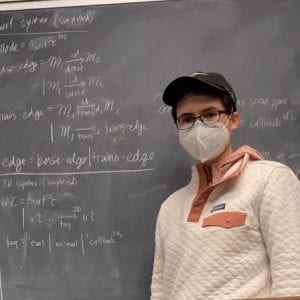
Please provide a brief summary of your research.
My work is part of a larger research project by Prof. Christos Dimoulas and PhD student Lukas Lazarek that studies how we can evaluate the usefulness of programming language features. In this specific project, we are interested in the features of type checking and blame reporting in gradually typed languages – languages such as Typed Racket that allow programmers to add type annotations to where they think is most useful, creating interactions between typed and untyped code. We evaluate usefulness based on how often a simulated programmer manages to determine the location of a type mismatch in a buggy program using the language-provided features across a suite of debugging scenarios.
Empirical research with this method so far indicates that, despite its theoretical superiority, Typed Racket is only marginally more useful than other academic and industrial gradually typed languages. However, the results are based on debugging scenarios that do not have the complex, so-called higher-order interactions between program components that theory says give an advantage to Typed Racket.
My research aims to create a new suite of debugging scenarios to properly evaluate Typed Racket. To do so, I am designing and implementing a generator for programs that takes in a specification describing the interactions between program components. By enumerating specifications with various degrees of higher-orderness, we will construct a new suite of debugging scenarios to evaluate Typed Racket.
What made you interested in pursuing (interdisciplinary) research more broadly?
I really enjoyed learning about programming languages in CS 321 and getting a taste of more advanced PL topics. I was also curious to see what research in computer science was like.
Describe your experiences with research thus far. Was it tricky? What skills do you think you’ve gained?
Research has been a really rewarding experience. The most difficult part for me was training because I was learning really in-depth about topics that I had never been exposed to before. There are also skills in research that it takes a while to develop, like reading papers (I am still working on this!). I’ve gained skills in managing my own projects/time and communicating both the successful results of research and when something is stuck. I enjoy the aspect of problem solving necessary for research.
Any tips or advice you have for students similar to you that are interested in pursuing undergraduate research?
Many labs/groups/professors have a track of undergraduate and graduate courses that will prepare you for research in their area. At least, this is what I heard from CS research workshops, and I’m sure it’s true more broadly, so don’t hesitate to ask professors how you can prepare academically to do research.
If you had unlimited time, money, resources, support, etc. what is something you would research?
How to slow down/stop/reverse climate change.
What meme lives rent free in your head?
It’s about drive it’s about power
Gregory
Gregory Svirnovskiy
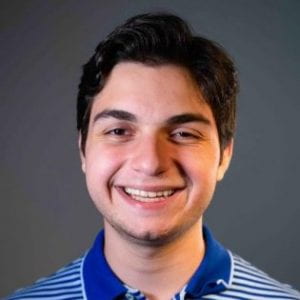
What made you initially interested in researching your project in particular?
For as long as I can remember, I’ve relaxed by watching videos of past major political events on YouTube and CSPAN. There’s so much out there. You can watch the each of the Walter Mondale and Jimmy Carter debates on YouTube, as well as coverage from Watergate and live reactions to the 1976 Presidential Elections. I found Rush Limbaugh in one of my CSPAN searches. His rise in politics was as fascinating as it was consequential. Professor Marshall and I were hooked.
Please provide a brief summary of your research.
By 1994, Republicans, and Rush Limbaugh in particular, had essentially cornered the radio media market nationally. And that resulted in real electoral consequences for Democrats, who were swept in Congress for the first time in nearly half a century in that year’s midterms. I spent the summer investigating ways Democrats looked to close that radio gap. Former politicians like Gary Hart, Mario Cuomo and L. Douglas Wilder started their own shows, each seeking to become “the Limbaugh of the Left,” but to do it with “thought talk” instead of bluster. For a myriad of reasons, it didn’t land.
What made you interested in pursuing (interdisciplinary) research more broadly?
It’s a skill I never gleaned through my classes at Northwestern, one that I think is necessary for someone that wants to go into journalism and write long-form investigative stories. I needed the training wheels.
Describe your experiences with research thus far. Was it tricky? What skills do you think you’ve gained?
There’s so much information out there. Too much, almost. I’ve learned how to refine searches, the key words to input for the most valuable links and documents.
Any tips or advice you have for students similar to you that are interested in pursuing undergraduate research?
Talk to people. When I started working with Professor Marshall this summer, I thought I’d spend it sifting through documents, reading papers and going through archives. I decided somewhere along the line to approach my research like a Journalist; by reaching out to potential sources and scheduling interviews. It’s how I ended up getting to talk to people like Gary Hart, Marjorie Margolies and Doug Wilder. Those interviews proved invaluable.
What is your most useless talent?
I know probably everything about every hockey player in the NHL. What teams they played for, where they were drafted, favorite foods, etc.
Vivica
Vivica Lewis
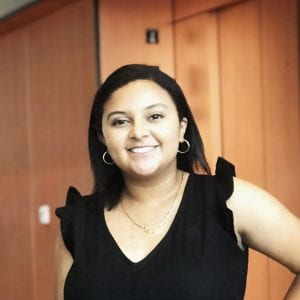
Please provide a brief summary of what you plan to research over the summer, where you plan to go, and why you chose those locations.
My research project is focused on investigating cultural shifts and youth education and engagement programs surrounding birth control methods, specifically within countries that have/had restrictive policies on the sales and usage of contraceptives. I plan on going to Argentina, Ireland, Romania, Singapore, and Japan. I chose these countries because of their past or present policies around birth control, but it was also important to me to ensure each one told a unique story. For example, Ireland’s restrictions were due to the Roman Catholic Church debates, so it provides a different narrative as the only country in the itinerary with a religious aspect. Japan legalized most forms of birth control in 1999 which is almost 40 years after Western countries, so it provides the perspective of one of the latest legalizations.
Describe your experiences with research thus far in your career.
I worked as a research assistant through the Undergraduate Research Assistant Program (URAP) my first year at Northwestern. My experience was great, and I learned a lot, but I took a break from research after that because I felt I had a lot to figure out about myself and my professional goals before returning to it. Now, as a third-year, I have a greater idea of my career goals and the research process, so I felt ready to apply for this grant.
What made you initially interested in researching your topic in particular?
I have been interested in reproductive health since my own high school health class experience. Coming from an urban community, sexual health was thought of and taught differently, and I saw so many areas for improvement at 17 years old. Once I came to Northwestern, I started taking classes related to reproductive and maternal health, and I really found my passion. I also started working with outside organizations, like Illinois Contraceptive Access Now (ICAN!) and Peer Health Exchange (PHE), which developed my technical skills and helped me start to think about what kind of career I could build in this field. Once I considered what to research, it felt natural to choose a project that allowed me to study sexual health education programs on a global scale considering my classes, work experience, and just passion!
Any tips or advice you have for students interested in pursuing undergraduate research?
My biggest piece of advice is GO FOR IT! It sounds simple, but I felt very hesitant early on to apply for such a large grant. I am extremely grateful to my family and friends that supported me from day one when I mentioned this is what I wanted to do. The field of research has been and continues to be exclusive in many ways, but I would encourage students from various backgrounds with unique perspectives to start getting into it. The Office of Undergraduate Research and faculty are here to support you every step of the way. I recall many late-night re-writes of portions of my proposal, texting friends that I was not sure I could do this, and even doubting myself, but I can say I am so glad I did not give up. So, if you are even thinking about getting into research, I hope you know that you are not alone, and you are beyond capable to do this, so start writing.
Do you collect anything?
I have always loved reading, so I keep my top almost 50 books in my room now, but I have way more back home. I read almost exclusively young adult fiction when it comes to reading for fun. I also have met many authors through book conventions around the country, so I have some signed copies that are precious to me!
What is your favorite dessert?
I love chocolate! Chocolate ice cream has been my favorite since I was a kid, and I will always choose a slice of chocolate cake!
What is your most unusual talent?
I am not sure if I would call it a talent yet, but my roommate and I recently purchased an air hockey table for our place. We play quite often, and I am not sure what I am preparing for, but I realized I am pretty good at air hockey!
Samson
Samson Mbogo
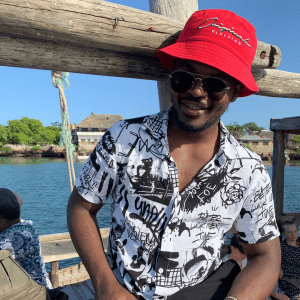
What language did you study and why?
Spanish. Since I was a kid, I have loved football (soccer), and I remember the many fun times that my father would take me to the stadium to watch the Kenyan national team play. My love for this sport has only grown over the years; I play football for my university, play FIFA video games, and currently, I am focusing my journalism career on researching, studying, and reporting on football. The love for soccer and its integration into culture in Spain excites me so much. I am focused on learning these aspects of the sport and translating them in my home country, hoping that the sport will develop to the levels it has peaked in Spain. I hope to emulate the integration of football into a culture in Spain to the Kenyan football scene. As a journalist, my biggest barrier was communication. I needed to learn Spanish to engage with the local community more deeply. Last summer, I was privileged to get that opportunity from Northwestern Undergraduate Language Grant.
What program did you attend and why did you choose it?
AIL Madrid. Initially, I was looking forward to traveling to Spain for my language study, but unfortunately, due to COVID-19 restrictions, I had to take my program online. AIL provided me with a very engaging online study program from native speakers for tutors to weekly virtual tours around Madrid. The reviews that the program had received online too were positive, and when I enrolled, I was not disappointed.
Describe your experience doing summer language study. Was it tricky? How do you think your language skills improved?
It was completely different from what I expected, in a good way, though. When I got in class, I heard the tutor speaking in Spanish, and I was waiting for them to finish and translate what they had said in English. They informed us that learning this new language meant they would not use translations (unless necessary) because that would slow our learning process. This aspect got me being very attentive in class and doing extra work outside of class to ensure I understood better what was being taught, and at the end of it, I found that technique very helpful to my overall learning of the language because my skills improved immensely from writing to reading and speaking.
Did intensive summer language study change or solidify any of your future goals? If so, how?
Learning Spanish has made it easier for me to access more documents in my research on how culture and football are intertwined in Spain. This is major step forward as a journalist focused on learning more about football and culture in Spain.
Do you have any tips or advice for students similar to you that are interested in pursing intensive language study?
Have clear goals on why you want to study the particular language, that helps you to be more driven and focused during your study. Do enough research about the program where you want to take your language, that completely defines how successful your language study will be. Be open minded, have fun, try new things and enjoy especially if you get to travel because learning a new language is meant to be fun 🙂
If you had unlimited time, money, resources, support, etc. what is something you would research?
Whether we can become immortal.
Favorite breakfast food?
Crunchy bacon, avocado, runny eggs, toast and milk.
What is your most useless talent?
Moving my ears.
Daniel
Daniel Ozernyi
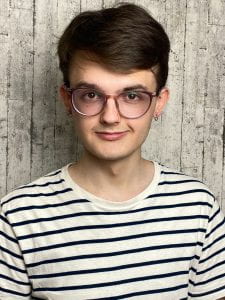
Please provide the tile and a brief summary of your research/conference presentation.
(1) L1 vs. L2 vs. L3 transfer: grammatical gender and determiner acquisition in sequential quadrilinguals (January 2021, Annual Meeting of the Linguistic Society of America).
Looking at how trilingual (Russian-Ukrainian-English) student acquire gender and definiteness in their L4 French I argue that language learning is cumulative, and all previous languages (L1, L2, L3) can influence acquisition of L4. The paper is accessible at https://doi.org/10.3765/plsa.v6i1.4891, the slides at my website dozernyi.com.
(2) “The crossroads of four languages: the complexity of language identity of quardilinguals in central Ukraine” (Mar 2021, UofBergen, Norway).
This paper was about the “foreign language effect” (it is easier for people to talk about “difficult”, “stressful” topics in a foreign language, foreign language mitigates aversion). I search for this foreign language effect in quadrilinguals, and I successfully find it.
(3) Vocabulary profiling of Polish “Matura”: corpus-based inquiry into content validity for high-stakes Central European state ESL examination (Oct 2021, Midwest Association of Language Testers).
I look at lexical composition of reading tasks in a Polish state exam of English as a second language. Using a levelled corpus of English lexicon, I establish that Polish exam is neither reliable nor valid measure of English proficiency: the lexical items in the reading tasks are far more advanced than they can be for the level the exam claims to test.
(4) EVP as a tool for evaluating the CEFR level-appropriateness of ESL reading examinations: corpus analysis of Ukrainian state assessment (Oct 2021, English Language Testing Society).
Similar to (3), but about Ukrainian state assessment. I found that Ukrainian exam is even less reliable and less valid.
(5) (with Soe Young Lee) Developing a binary-branching decision-tree rubric for assessing speaking: case of ENGin program (Oct 2021, East Coast Organization of Language Testers).
In this talk, we talk about the process of creating a rubric of assessing speaking proficiency tailored to specific needs of ENGin program (a non-profit which pairs up Ukrainian teenagers with native speakers of English). We go through development and validation research on the rubric.
*upcoming*
(6) Linguistic transfer, or there and back again: A chronological study of terminological meandering (Jan 2022, Annual Meeting of the Linguistic Society of America).
I investigate the history of the term “transfer” in linguistics: a long journey from 1890s to present day only to conclude that “transfer” does not have a definition and ought to be abandoned in favor or more formally rigorous definitions.
(7) “Dostoevsky and Ukrainian Literature: Late 19th and Early 20th Centuries Concordances and Tensions” (Mar 2022, Northeast Modern Language Association).
I talk about the influence of Dostoevsky on Ukrainian literature focusing on early modern Ukrainian writing (1910s-1930s), and the dim view Ukrainian writers took of Dostoevsky, yet referring to the motives of his prose. I go through some of the writings of Ivan Franko, Mykola Khvuliovyj, and Oles’ Honchar.
(8) “Teaching British Poetry in a Ukrainian ESL Classroom: Reasons, Results, and Lessons to be Learnt” (Mar 2022, Northeast Modern Language Association).
I look at the potential concordances between modern theories of second and third language acquisition and teaching poetry in classroom. I overview my experience teaching British and American poetry in Ukraine and conclude with subjective recommendations apropos of what is to be avoided while using the poetry in an ESL classroom, and what can be a useful tool.
(9) (with Soe Young Lee) “Evaluating Lexical Resource of Spoken English With Vocabulary Profiling” (Mar 2022, International TESOL Convention).
We look at the potential of automated tool of vocabulary profiler (an instrument which analyzes transcribed speech by level of “advanceness” vocabulary in it). Based on our data and analysis of a corpus of such transcribed speech, we conclude that polysemy and lack of ability to identify lexical mistakes renders automated lexical profiling an utterly unsuccessful tool for assessing second language speech.
(10) “On initial state, initial stages, other fantastic beasts, and where to find them” (Annual Linguistics Symposium at UC Berkeley organized by the Society of Linguistics Undergraduate Students).
What made you initially interested in researching your project in particular?
First of all, I am thankful to people who helped me on the way — they made sure not to stop me from submitting, and didn’t get too grumpy when I didn’t make sense (in some areas, I still don’t). In high school, I reached out to Prof. Suzanne Flynn (MIT Linguistics) and she could have totally ignored my email (being a pretty famous professor) — but she replied, we met, and we’ve been in constant touch for two years now. She influenced me significantly. She acquainted me with Megan M. Brown (BU Lingusitics) who has been of incredible assistance — I know that when I have an abstract I think doesn’t make sense (and it usually doesn’t), a review with language that is too strong (and it usually is…, I got my opinions…), need a quick consult on particular subfield, I can always reach out to her. She’ll be completing her PhD soon, and I’m excited about the work she does. Lastly, a really important, crucial, vital, existential thing for me is to have a teacher who shares my view of language and whose knowledge and opinion I value, but who can and will change and challenge the ways I think about problems in language and language acquisition. This is such a rare find. When I came to NU, I was coming knowing that there’s one such person at this university — and I’m all too giddy that I get to learn from him. From Prof. Masaya Yoshida, that is. I’ve only known him for a quarter, but I already learnt more syntax than in all my life previously (roughly). There are other people who I met at some point of my journey and who helped me, of course, but these three are (and will be) key, I feel.
In terms of why I’m doing this: I deathly love language and principled inquiry into language. I generally work within many areas — language acquisition, language assessment, language teaching, even literary theory occasionally — but I focus mostly on generative (viz. Chomskian) language acquisition. I try at all times to emphasize the value of other fields for language acquisition.
We have learned so much since Chomsky (1955), but so much more work needs to be done! It is very important to realize the multidimensionality and multifaceted-ness of limitations of research that can be done in language acquisition. Very little can be done that is meaningful, in my view — despite the abundance of the questions which are unanswered. The current research does not seem to be acknowledging this — they acquisitionists should talk to syntactitians and get some picture of what’s happening in real world.
What conference(s) did you present at and how did you find out about them?
For the list of conferences, see the list of the presentations above. In terms of learning about them, listservs mostly, such as LinguistList. The people who are doing LinguistList pro bono are really doing a great service for a big international community of linguists, both experienced ones, and the ones who are starting out — like me.
What was it like presenting at a conference? Anything that you didn’t expect?
Yes, I didn’t expect people to be friendly. But it depends on the kind of conference: if you’re presenting at a conference with a very narrow focus and everyone knows each other, then things will probably get rough. This hugely depends on the field as well. If, however, you are going to something a big field-general conference, in all likelihood you won’t meet another person from your exact area. I was the only L3 person in LSA’s Annual Meeting in 2021 (I think). This year, a friend of mine from BU is going to be the only one there presenting on L3 acquisition. But conferences are for networking, really — talk to people, get to know them, ask questions. The research communities are usually very welcoming and helpful!
Any tips or advice you have for students similar to you that are interested in presenting at a conference one day?
Don’t be afraid to submit. Those presentations above are accepted ones, but I’m not going to tell you how many I had rejected. Don’t be shy and remember that everyone has an impostor syndrome: you know your topic better than anyone at that conference.
Do you have a podcast/documentary/piece of shareable media related to your research?
My website, dozernyi.com and links there provide some more information about the things I do, viz. full abstracts, slides, previous work, etc.
If you had unlimited time, money, resources, support, etc. what is something you would research?
Frankly, I’d share resources with syntactitians so that they can do some work in order to advance our knowledge of language faster and in a collegial manner. I’ll discriminate and only share resources with those strictly within Chomskian tradition, ahah. I don’t really think other ways of inquiry have much to offer. External language is, to our inquiry, so to speak, at best marginal, and perhaps not empirically meaningful at all. Understanding of syntax is necessary in order to do work in acquisition, etc.
If I had to point to an area, I guess one would be language processing. The current work on processing gapping is very exciting, and should be extended to other languages, other modalities, multilingual contexts. The only concern is that — once again — very little *meaningful* work can be done without comprehensive successes in adjacent areas. For example, not having carefully investigated phenomenon A in both Japanese and English you cannot do any studies on acquisition or bilingual/ second language processing, etc of A. Syntax is core, really. Wherever you look.
Favorite breakfast food?
Sleep.
What’s the most interesting thing you’ve learned/read about/listened to this week?
I listen to a lot of rock (or so Spotify told me quite recently). I read papers, they are always stirring — sometimes in a good way, sometimes in a bad way. But come to think about it, St. Anselm’s Ontological Argument from the Logic class was fun this week (credits to Dr. Sean Ebels-Duggan here).
Anna
Anna
